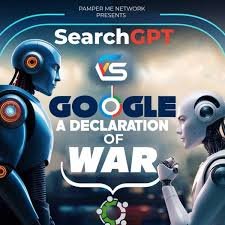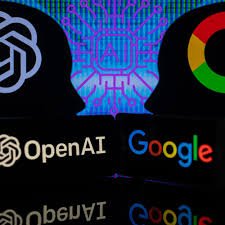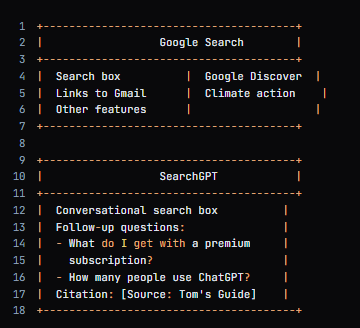Open Ai launch a new search engine called SearchGPT which is an advance conversional GPT or Ai Model. SearchGPT is design to increase user experience in a conversation and for topic exploration and also allow them to ask multiple questions with complexity.

Table of Contents
- Introduction
- Interaction Style
- Response Format
- Contextual Understanding
- Information Sources
- Personalization
- Utility and Use Cases
- Conclusion:
Introduction:
Google Search was widely known as the King of Search in providing high accurate and relevant search quality. However, new entrant SearchGPT is making waves with a very cool conversational search. well, lets discuss what are the primary differences between these two search powers.

1. Interaction Style
SearchGPT (Conversational AI)
- Conversational Approach: Talkative with users! This lets you ask follow up questions, dive deeper into a topic or change the subject with ease.
- Follows context: It continue with the conversation so as to response more aptly in terms on replies it sent earlier.
- Conversational Responses: Adapts answers in real-time, so the conversation is one of a kind.
Google Search
- Search Keywords: Results of the search processed ad-hoc; Every search query is associated to an individual task.
- Search-based (Non-interactive with no interaction or dialogue continuity)
- Search Refinement: Users refine searches by altering queries or choosing other results from the list.


2. Response Format
SearchGPT (Conversational AI)
- Direct Answers: Gives exact answers to questions in detail with explanations and summaries as requested.
- Contextual Responses: Serve detailed insights and responses tailored to the context of an ongoing conversation.
- NOTE: Ideal for creating ideas and brainstorming as well help to provide structured insight on a variety of topics.
Google Search
Rich Media – Embeds images, videos and news articles in traditional text-based results.
Organic results are the list of links (usually 10) to web pages that appear below the ads in a search engine result page.
Featured Snippets: Offers direct answers or summarized content at the top of the search results page for quick info access.
3. Contextual Understanding
SearchGPT (Conversational AI)
- Persistent Context: Retains awareness of the conversation as it evolves to provide more subtle and timely responses.
- Complex Queries: It deals with multi-turn conversations, answering complex queries that depend on previous interactions.
- Smart Replies: Modulates the responses that make when they are asked in a conversation, language and person adaptable.
Google Search
Relevance of Results – Search results can depend on factors that are inherent to each query and do not change based on previous behavior.
Silent Logging Each search is in isolation and the component does not keep track of any data entered into previous searches.
Alongside these Contextual Clues: demand that you add plenty of context to each query as there is no recall for past searches.


4. Information Sources
SearchGPT (Conversational AI)
- Knowledge Base: Uses a wide selection of pre-trained knowledge from many possible sources, including leading up to the last update.
- Caution: The information on this article might not be the most up to date as they were written since the last training performed.
- Not Real-time: Does not have a functional connectivity or live sync with the web.
Google Search
Dynamic Content: Current changes and new age on the web news or topics.
Indexing in real time: This means that information changes with the WebPages and gets properly updated.
Plentiful Base of Sources: Gathers info from multiple sources, such as news sites, academic resources (like dissertations), blogs or forums just to name a few.
5. Personalization
SearchGPT (Conversational AI)
- Contextual Personalization: customizes responses based on current conversation context; no personal data/history used
- Generic Responses: Offers general, one-size-fits-all information unaffected by user profiles or prior interactions.
- Interaction Specific: Personalization is limited to context and flow of current interaction.
Google Search
Local-Based Results: It serves location-specific information and results based on the user’s defined geographical area.
User Personalization: Leveraging search history, location and other specific user data to serve results based on individual likes/preferences/conduct.
Personalization of Search Results: Just like any other Google search results, they can change based on everything from my past history to whether or not I am actually signed in while conducting a post.


6. Utility and Use Cases
- SearchGPT (Conversational AI)
- Tutorial- Perfect for explaining ideas, flat answers to queries and education support as well.
- A very effective method for brainstorming, creative thinking or solution generation.
- Interpolate Solutions: Efficient for interpolating possible solutions or giving general advice on certain problems.
Google Search
Live Updates: Great for following news, trends and general changes on the web.
Readitfor.me vs Getting Smart: Which Is Ideal? The Learning Curve Society
Resource Discovery (pull): Great to discover resources including academic articles, videos and other content.
Conclusion:
To conclude, Search GPT does well to handle conversational context-driven prompt-type response as well as with personalized interactions whereas Google search is still the best so far for processing real-time queries like information retrieval and broad resource discovery. And every tool is designed for use on its own, or to augment complementary contextual solutions.

Frequently Ask Questions
Q1: What is primary difference in SearchGPT and Google Search?
Google Search: Non-interactive with no interaction or dialogue continuity.
SearchGPT: Adapts answers in real-time, so the conversation is one of a kind.
Q2: Is SearchGPT provide real-time updates?
No, SearchGPT does not provide real-time updates.
Q3: Both Google Search and SearchGPT we used together effectively?
Yes! Google Search provide real-time updated information while SearchGPT provide detail information.
Q4: Is there any limitations of SearchGPT?
Some are major limitations of SearchGPT:
Lack of real-time information
Lack of updated information
Does not use personal data and history to response
Depend on already present date
Q5: Is there any way where SearchGPT is most effective?
Yes! Here are some major points
- For Education
- For Detail Information
- For Complex Solutions